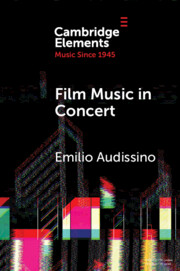Element contents
Film Music in Concert
Published online by Cambridge University Press: 19 November 2021
Summary
Keywords
- Type
- Element
- Information
- Series: Elements in Music since 1945Online ISBN: 9781009006941Publisher: Cambridge University PressPrint publication: 16 December 2021
References
- 6
- Cited by



